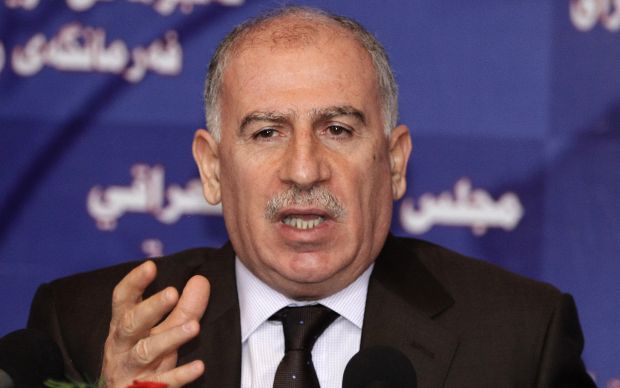Baghdad, Asharq Al-Awsat—Iraq’s largest Sunni parliamentary bloc has strongly denounced the Islamist militant group the Islamic State of Iraq and Syria (ISIS) and its extremist ideology, as reports came in that the militant group had seized three further towns in the restive Western Anbar province overnight.
Parliament Speaker Osama Al-Nujaifi, who heads the Sunni Mutahidoun bloc which won 33 seats in the last elections, has stressed that both the leaders and grassroots supporters of the bloc are completely against ISIS and its “takfirist” ideology.
This strengthened denunciation of ISIS comes at a time when reports suggest that some Sunni Arab tribes have shown sympathy to the group, mainly because they hope to oust the Shi’ite-led government in Baghdad over what are seen as its overtly sectarian and divisive policies.
In a statement following a meeting with a number of religious clerics, Nujaifi said: “Everyone should have a clear and strong stance against their [ISIS’s] crimes.”
He said his contacts and meetings with countries’ leaders and political parties over the past few days have “resulted in a common understanding about the need for change [in the government] and working towards a new approach that does not involve the exclusion or marginalization of anyone.”
Iraqi politicians try to form a new government after April 30 elections that saw controversial Prime Minister Nuri Al-Maliki’s State of Law coalition win the most seats in parliament, but not a clear majority. Maliki, who has served as prime minister for eight years in addition to being interior and defence minister in the last government, is facing stiff opposition to his bid to secure a third term.
Nujaifi’s statement said he had told US officials that any potential military action should protect civilians and “cause no damage” to infrastructure, and “should be accompanied by a political solution capable of handling the causes [of the problem] . . . Otherwise the country will head toward serious consequences.”
He also noted that there are “unsuccessful attempts” to blame terrorism on Sunnis, “although Sunnis are hit the hardest by the crimes of terrorism.”
In this context, Essam Al-Obaidi, a senior figure in the Mutahidoun bloc, told Asharq Al-Awsat that people in the western parts of the country are “paying the price of crimes committed by ISIS gangs and all terrorist organizations, which we have always warned the government about, but it [the government] failed to secure the country’s borders, making it a pass for all gangs and militias going to Syria under the pretext of defending holy places and those coming from it [Syria] in various ways”.
Several Sunni groups, particularly the Mutahidoun bloc, have shown strong opposition to the Maliki government.
Obaidi called for differentiating between “criminal gangs” and people with “legitimate demands,” criticizing the government for dealing with peaceful protests over the past two years in the western, Sunni-dominated part of the country either with “iron and fire” or “total ignorance.”
Meanwhile, an Iraqi politician who requested anonymity told Asharq Al-Awsat that the Sunni leaders had started to understand that they have to be more alert to “what is being plotted” against their popular opposition activities, in particular the attempts to link Sunni political opposition to terrorist activities.
“The war on ISIS must include all [Sunnis], from the point of view of some Iraqi leaders,” he said.
“The US today seems to show more understanding than ever about the demands of the Sunni Arabs, which made the US president hesitate on how to step in to repel the ISIS,” the well-informed politician added.
“The US administration listened recently to advice from Arab and Iraqi leaders on the situation in Iraq, which gave the Sunni leaders new options, mainly declaring their categorical rejection of ISIS so that the US administration is encouraged to fight it, on the one hand, and pressure Maliki to allow a broader partnership [in government].”

